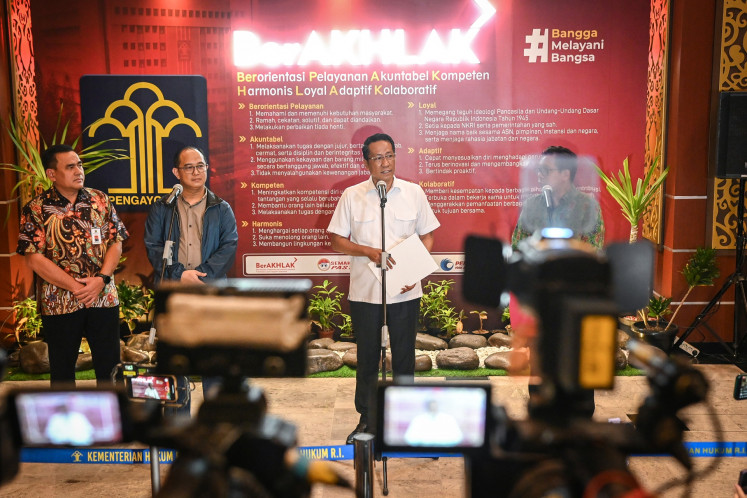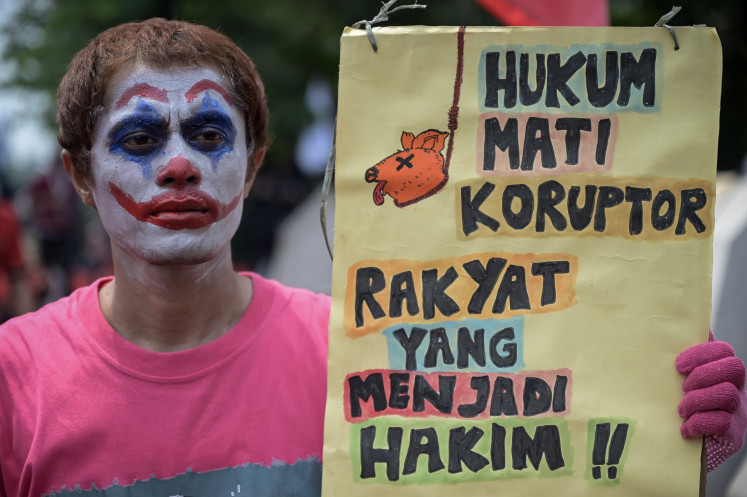Popular Reads
Top Results
Can't find what you're looking for?
View all search resultsPopular Reads
Top Results
Can't find what you're looking for?
View all search resultsAlarming level of diaper pollution in Brantas River
River no for diaper: Environmental activists call on people to stop dumping used diapers into the Brantas River in Malang, East Java on Tuesday
Change text size
Gift Premium Articles
to Anyone
R
span class="caption">River no for diaper: Environmental activists call on people to stop dumping used diapers into the Brantas River in Malang, East Java on Tuesday.(JP/Aman Rochman)
For most parents, choosing disposable diapers over reusable ones for their babies is simply a matter of practicality.
A recent finding by environmentalists in East Java, however, may prompt parents to think about using reusable diapers instead.
Seven activists have been cleaning the Brantas River in East Java for the past few weeks and claim that disposable-diaper waste makes up 80 percent of the total waste they have found in the river.
The Brantas, which is the second-longest river in Java after the Bengawan Solo, is also the source of raw water for many cities in East Java including provincial capital Surabaya.
The members of Ecological Observation and Wetland Conservation (Ecoton) call themselves the Kuapok (diaper removal) Brigade. They have been to seven locations along the river and collected an average of 1.2 tons of disposable diapers in each location.
Four of the locations are in the downstream area of the river, namely Surabaya, Sidoarjo, Gresik and Mojokerto; and the other two are in the upstream section, namely Malang and Batu.
In Malang, the activists stood on the Moharto Bridge and used nets to remove diapers that were flowing past or were stuck between the rocks on Tuesday.
They later took the diaper waste they had collected and dumped it in front of the city’s environment agency as they staged a rally in protest at the city administration’s lack of effort to prevent diapers from being dumped in the river.
”The human waste left in the diapers could be dangerous to the ecosystem, fish and eventually human health, while 70 percent of the material used to manufacture the diapers is not degradable in water,” said Azis, the brigade coordinator.
Reports say disposable diapers take hundreds of years to biodegrade.
However, residents living along the river had various opinions on the matter.
Hilda, a mother of a six-month-old baby, acknowledged the baby went through about four disposable diapers per day, but she claimed she had never dumped used diapers in the river.
“I also oppose my neighbors who dump diapers to river, but not all of those who dump diapers from Muharto Bridge are residents of the nearby neighborhoods,” she said.
Another riverbank dweller, Pratiwi, admitted she often dumped used diapers into the river.
“My mom and grandma told me that if I dumped used diapers in the bin they would be taken to a landfill and burned, the haze from which could cause skin diseases in people,” she said.
Prigi Arisandi, one of the activists, said that cultural factors had been one of the challenging issues.
“There is a belief among Javanese people that a used diaper should never be burned as the baby who wore it could later get a disease. This should be addressed by continuous dissemination of the dangers of dumping used diapers in the river,” the
activist said.
Malang Health Agency head Asih Tri Rachmi Nuswantar said such a belief was a myth.
“It would be better if used diapers are cleaned before being dumped in trash bins,” she added.
Malang Environment Agency head Agoes Edy Poetranto, when asked about the diaper pollution in the river, refused to take the blame.
“Big rivers like the Brantas fall under the jurisdiction of the East Java provincial administration. We only deal with smaller rivers,” he said.
Globally, there have been campaigns about using reusable diapers as it is considered a greener, more natural and cheaper option.
But counter campaigns have also emerged, claiming that the environmental impact of cloth diapers would be similar to that of disposable diapers if the laundering process is taken into account.










